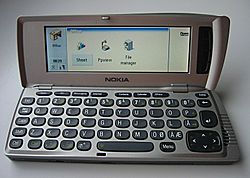
The Nokia Communicator is a brand name for a series of business-optimized mobile phones marketed by Nokia Corporation, featuring a laptop-like form factor, which opens in a clamshell format to access its QWERTY keyboard and an LCD screen nearly the size of the device footprint.
Contents
Nokia Communicators have Internet connectivity and clients for Internet and non-Internet communication services. The earlier 9000 series Communicators introduced features which later developed into smartphones. The latest Communicator model, the Nokia E90 Communicator, is part of the Nokia Eseries. The Nokia E7, released in 2010, is considered a successor to the Communicator series.





